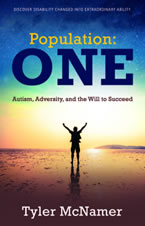August 30, 2013
Population: One
Autism, Adversity, and the Will to Succeed
Tyler McNamer
Aviva Publishing (2013)
ISBN: 9781938686542
New Book Offers Personal Look into a Unique Young Man’s Autistic Mind
 Tyler McNamer’s Population: One is a unique book written by a young man with autism. It is a collection of diverse writings, including creative pieces, autobiography, essays on teenage subjects, and insights into what it is like not only to have autism but to see the world from a different perspective.
Tyler McNamer’s Population: One is a unique book written by a young man with autism. It is a collection of diverse writings, including creative pieces, autobiography, essays on teenage subjects, and insights into what it is like not only to have autism but to see the world from a different perspective.
Early in the book, Tyler describes himself by stating, “I am nineteen years old and have been blessed with autism my entire life. I have chosen to accept my label of autism not as a ‘disability’ but as a ‘unique ability’ and I want to help you overcome the label that you may have suffered from for many years of your life.” As for his book, Tyler states, “this book is not just a book about autism—it is a book about how we can all live together in harmony regardless of our differences” and “Most importantly, you will learn how we can all co‐exist together in harmony as a population of one to make our existence together better, more peaceful, more fulfilling and purposeful.”
What does Tyler mean by a “population of one”? As someone with autism, Tyler has known what it is to feel alone in the world. He was abandoned by childhood friends when he reached high school, and he realizes his perspective is different from others; for these and other reasons, he lives in his own world, which has a population of one. But being a world with only one person as its population is not necessarily a negative thing. Tyler realizes that we all are to some extent not just alone but our own individual worlds. He states, “You see, my friend, I have a world. You have a world. It represents who you are, what you are interested in, and what you like. I like the color red, so I have a red world. My favorite music is...well, I have a lot of favorites, but let’s say jazz, my national music is jazz.”
As you can see from these passages, Tyler has a unique view of life, and of what it means to be autistic, and a unique view on many other topics as well. This book is not just about being autistic. Tyler has written fifty short chapters or essays on different subjects, which range from bullying and leadership to a creative short story he has written, an article he wrote for the high school newspaper, and his hopes and dreams for his future.
What I really appreciated about this book is that Tyler is not afraid of expressing himself or his opinions, and when he does, he appears to have a great deal of common sense, speaking out against things like dirty dancing at the school dances, refusing to fight except in self-defense, and believing that we tend to make things more difficult than they really are. He especially speaks on issues of concern to teenagers, including dating, drugs, depression, and loneliness. At one point he states:
“I’ve heard my classmates tell their stupid stories about them doing stupid stuff and saying that they enjoyed it. I thought of asking, “Really? You smoke marijuana and you like it?” but then they would repeat the same answer. Who knows whether their answer is coming from the heart or from the mind. People lie just to make themselves look cool. To me, it makes them look ridiculous.”
Population: One is a book that will give insight to anyone. I think teenagers will especially find it fascinating and it may help them better understand their fellow classmates, autistic or not. Parents and teachers will better understand their autistic children after reading it, and readers in general may learn to think a bit outside the box and see all the good things in life surrounding them when they consider that some people, like those with autism, may have more reason than them to be unhappy, and yet, if Tyler can find so much about life to enjoy and be excited about, they can do the same.
Tyler refuses to be put inside a box. In fact, he states, “I have decided to be “multi-themed.” By multi-themed, I mean that I can be whomever I want to be in different areas.” And like Dickens’ David Copperfield, Tyler wants to be the hero of his own life, stating “The best kind of freedom is the freedom to do good. It’s what makes heroes.”
Any young man with autism who writes and publishes a book while completing high school is a hero in my book. After you read Population: One, I think you’ll agree.
For more information about Tyler McNamer and Population: One, visit www.populationone.com
— Tyler R. Tichelaar, Ph.D. and author of the award-winning Narrow Lives

